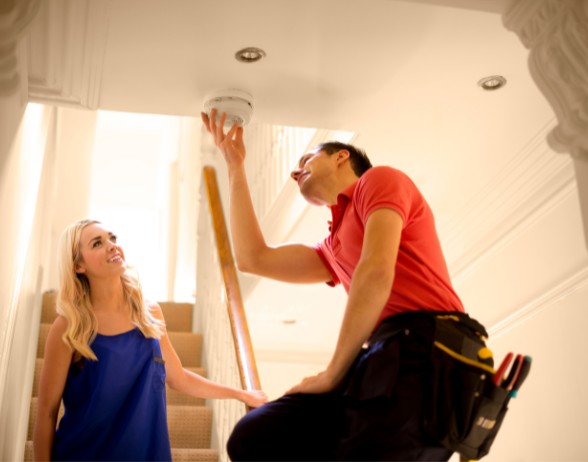January 9, 2023
Selling a house? Your guide to smoke alarm compliance for 2023
New smoke alarm legislation was introduced in 2022 requiring home owners to have interconnected photoelectric smoke alarms installed in their residences.
What Are The Rules?
Sellers must disclose to the buyer at the time of contract whether or not there are compliant smoke alarms installed in the property.
Under the standard terms of the REIQ contract for the sale of property in Queensland, the buyer is entitled to an inspection by a licensed electrician prior to settlement to ascertain whether the smoke alarms are compliant.
If the smoke alarms are not compliant by settlement, this does not give the buyer the right to cancel the contract, but the buyer will be entitled to a reduction of 0.15% of the purchase price.
Form 24 Disclosure
The seller is also required to disclose at settlement whether complying smoke alarms have been installed. This is done on the Form 24 Transfer of Title form which is subsequently lodged with Titles Queensland. The Queensland Fire and Emergency Services can then access this information.
It is important to note that failure to have compliant smoke alarms installed is also an offence, even if it has been disclosed to the buyer.
Smoke Alarm Requirements
To be compliant, smoke alarms must be installed in the residence;
- on each floor
- in each bedroom
- if there are no bedrooms on a floor of the house, at least one smoke alarm must be installed in the most likely path of travel to exit the dwelling
- if there is no hallway, between the bedroom and other parts of the floor
- The smoke alarms must be;
- Photoelectric and not also contain an ionisation sensor
- Hardwired into the mains power supply, if currently hardwired. Otherwise, smoke alarms can be either hardwired or powered by a non-removable 10 year battery or a combination of both
- Interconnected with all other smoke alarms in the residence, so when one is activated, they all are
- Compliant with Australian Standards, be less than 10 years old, and working when tested.
The above is a summary of the legal requirements, and more information is available on the Queensland Fire And Emergency Services website.
Queensland Smoke Alarm Laws And Residential Tenancies
Landlords are responsible for ensuring that their rental properties are compliant with smoke alarm legislation. This includes testing and cleaning all smoke alarms before the start of a new tenancy, or the renewal of an existing tenancy.
The tenant is responsible for cleaning and testing the smoke alarms at least every year, and for alerting the agent or property manager if there are any issues.
The Residential Tenancies Authority has more information about residential tenancies and smoke alarm compliance.

More Questions?
If you have any questions about the legal requirements in relation to smoke alarms, or any other aspect of conveyancing in Queensland, our friendly conveyancing solicitors are available to take your call. Contact us today!
The above is not legal advice and is general information only.